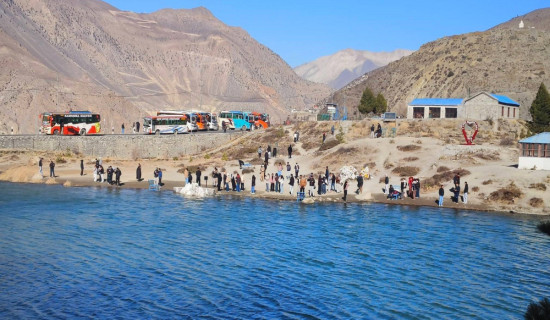- Wednesday, 21 January 2026
Comes Up With Win-win Resolutions
The recent central committee (CC) meeting of Nepali Congress (NC) concluded with win-win resolutions. Party president Sher Bahadur Deuba has chosen a middle path to deal with the proposals presented by two general secretaries – Gagan Thapa and Bishwo Prakash Sharma. The establishment led by president himself and the dissidents were divided on Thapa’s organisational report and Sharma’s document on contemporary politics. Deuba stepped up to the plate to take both Thapa and Sharma into confidence, sending a positive message to the party’s rank and file. In doing so, Deuba even ignored his loyalists dead set on rejecting both the proposals as the establishment holds much sway over the CC.
Thapa had proposed that the NC should not forge pre-poll alliance with any political parties, hold the general convention within 2082 B.S. and constitute a statute draft committee at the meeting that ran for more than three weeks. Similarly, in his report, Sharma floated the concept of exit policy to set the terms of elected officials in the vital state organs. Thapa’s proposal was not much contested as it wanted that all NC supporters and well-wishers vote for the party symbol ‘Tree’. Apparently, Thapa’s proposal was popular among the party workers. It has been inferred that many NC supporters became estranged from the party as it contested polls by forging alliance with the CPN-Maoist Centre and other parties. Instead of voting for the parties other than the NC, they switched to other parties, a reason behind the decline of its popular votes.
Pre-poll alliance
Thapa’s proposal was also approved by the party Mahasamiti held in Lalitpur last February. But it has become the party’s policy only after the powerful CC gave it the go-ahead. Although the CC accepted Thapa’s proposal, some party stalwarts within the establishment insist that it is a strategic matter whether or not to enter into a pre-poll alliance. As the party has decided that it will secure majority in the elections and emerge as the first largest party, it can’t be guaranteed that it will not ally with other parties during the polls, they claim, adding that it largely depends on the conditions before the elections. As the CC has not definitely decided that there would not be a pre-poll alliance, many consider it is just a temporary acceptance of the proposal.
The CC meeting did not announce the date for the convention. Fixing convention timetable was tricky as there lay interest of both establishment and dissidents in it. Deuba wanted to hold convention in 2083 B.S., exercising the right that the party statute bestows on him in the capacity of president. The NC has to organise the convention in every four years. But the statute has given right to the president to extend it by one year. There are political factors why Deuba is hesitant to organise the meeting of the party's apex body in 2082 B.S. when his four-year stint as party chief comes to an end.
As per the party’s charter, Deuba can’t be president for the third time. It limits the party president’s tenure to two times. In accordance with NC-UML power sharing deal, Deuba will be prime minister after Oli completes two years in office. Deuba risks losing the premiership if the party holds the convention in 2082 B.S. which would elect a new president, and the party head will generally become the parliamentary party leader. However, Deuba has agreed to form the statute amendment committee which demonstrates that he is ready to hold the convention in the stipulated timeframe.
Meanwhile, Sharma’s exit policy seeks to limit the terms of persons aspiring to get elected in the top public posts so that new faces are circulated in the crucial organs of the state. As per this, one person can become the president for one term, prime minister two terms, minister three terms and lawmaker four terms. Similarly, Sharma proposed that one should not be allowed to lead the province for more than two times. One can be provincial minister for three times and lawmaker four times. Sharma’s proposal ruffled feathers of many in both camps of the party. If the CC had approved it, many of them would have lost their chances to be elected representatives and climb the higher political ladder. Even Deuba could not become the PM, had the party implemented the exit policy now. The CC meeting took middle approach to address Sharma’s proposal. It decided to bring the exit policy into discussion during the time of constitution amendment. This has seemingly spared Sharma’s blushes.
Power politics
Though the political leaders have aversion to the idea of setting the term limit of top elected office-bearers, the general public appreciates it. The people are sick of the bunch of gerontocrats who have been on the upper echelon of power for decades. If the fresh faces are given a fair crack of the whip, they inject vigour and dynamism into the state mechanisms stuck in a rut. Sharma’s bold proposal is unlikely to receive backing from major and minor parties alike as they have nurtured a habit of indulging in power politics for years.
The NC, the largest party in the federal parliament, only concentrated on the matters pertaining to the party organisation but failed to debate the burning issues plaguing the nation. Today's Nepali youths have lost their faith in the capacity of the state to provide quality education and gainful job to them. It is time for the NC to revisit its neo-liberal economic policy that has disincentivised agriculture and domestic industries. The neo-liberalism bats for free trade but gives short shrift to the production for it promotes multinational companies that eventually lead to the closures of local industries. Now the major parties should trace the factors behind the economic sclerosis. Only then do the parties' meetings and jamborees make sense to the commoners.
(The author is Deputy Executive Editor of this daily.)

















